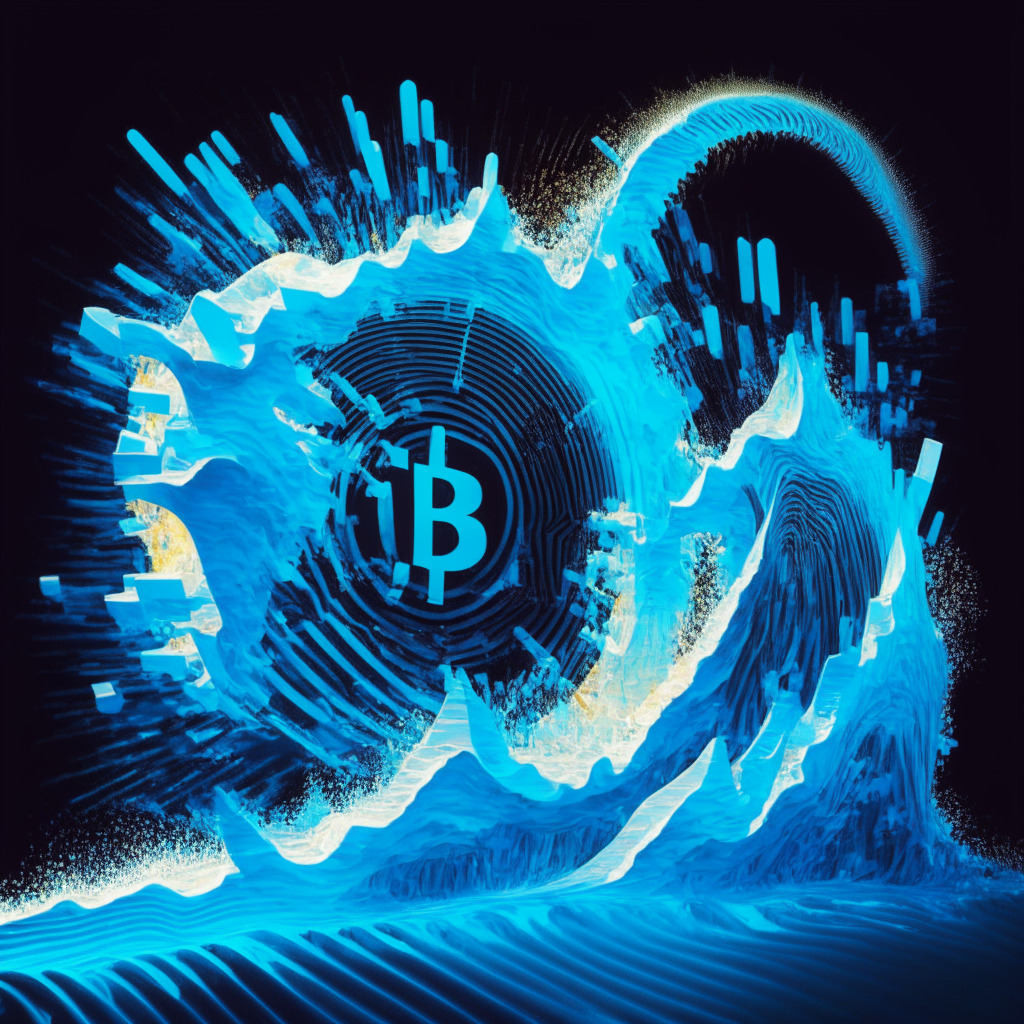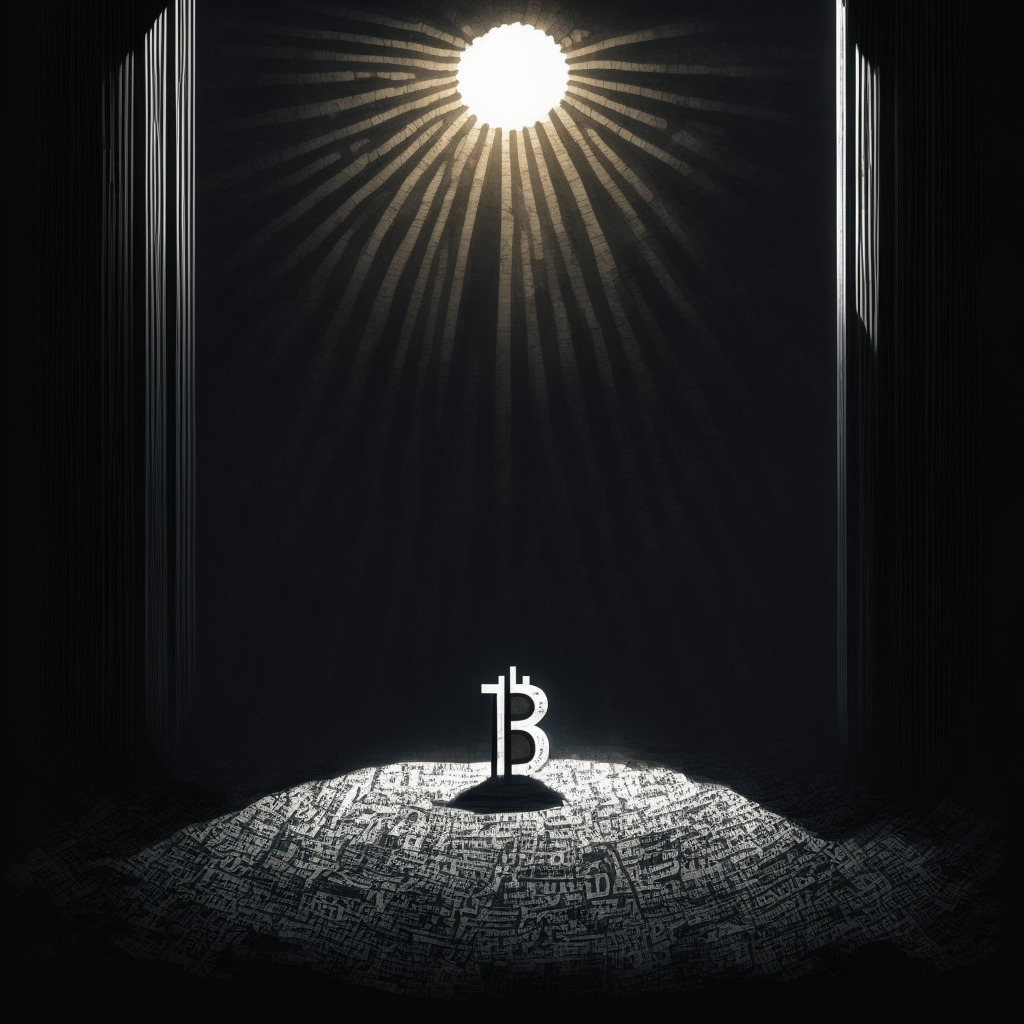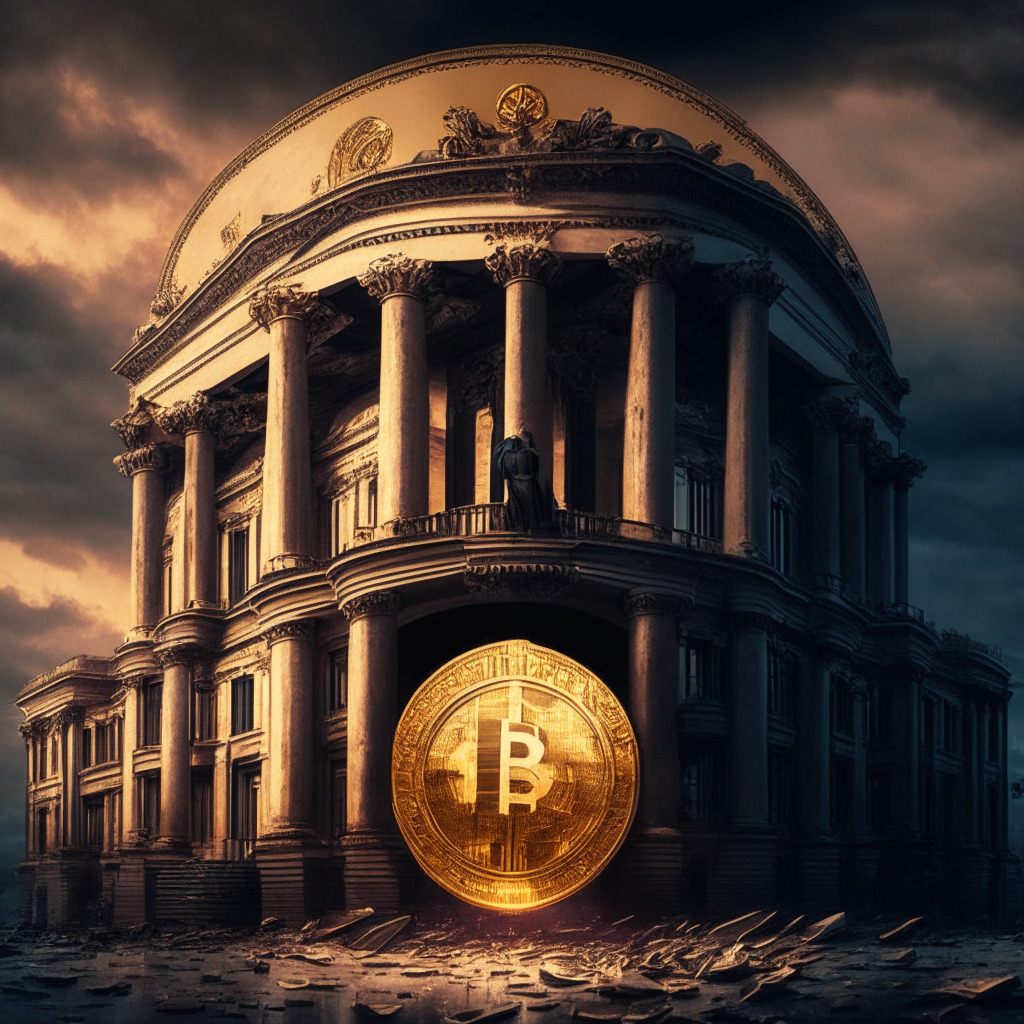EOS Network, a blockchain that garnered $4 billion in its initial coin offering, has been granted white-list approval by Japan’s regulatory body for crypto exchanges. This allows EOS to compete with major cryptocurrencies like Bitcoin and Ethereum on Japan’s regulated crypto exchanges. The approval signifies EOS’s compliance commitment and opens new opportunities for the network in the Japanese market.
Category: Regulations
EOS Gets Regulatory Approval in Japan: A Milestone for Crypto or a Threat to Anonymity?
EOS, a globally acclaimed cryptocurrency, has gained regulatory approval in Japan, allowing it to be traded against the Japanese yen on regulated exchanges. This marks EOS’s debut on the Japanese exchange BitTrade, highlighting the continued significance of the Asian market to the digital token’s growth. However, while exciting, regulatory acceptance raises questions about possible impacts on anonymity and decentralisation.
Rollercoaster Crypto Future: Bitcoin’s Recent Surge and the Mysteries of Market Dynamics
“Yesterday, Bitcoin rallied 6% following a U.S court ruling criticizing the SEC’s decision to refuse Grayscale’s Bitcoin ETF request as “arbitrary and capricious”. This led to speculation about a potential surge in crypto market capitalization, spurred by the movement of 30,000 Bitcoin to centralized exchanges.”
Grayscale’s Victory Stirs Up Controversy: Doubts Over SEC’s Gensler Heighten
“Cryptocurrency circles discuss Grayscale’s lawsuit and SEC chair Gary Gensler’s role. Congressman Warren Davidson suggests Gensler’s SEC decisions lack stead, as demonstrated by Grayscale’s legal victory. This opens up possibilities for a Bitcoin spot ETF emergence in the US, but the situation remains uncertain.”
AI’s Copyright Conundrum: Balancing Creativity and Tech Advancement in the UK
“The UK government’s proposal to exempt AI from copyright protections for system training using existing literature, music, and art has ignited controversy. Critics assert this potentially undermines creators’ rights and treats arts and cultural production as mere inputs to AI development. The dispute mirrors a broader tension between AI advancement and preserving creative rights, urging for a balanced strategy.”
Swiss SEBA Bank Navigates Hong Kong’s Evolving Crypto Regulatory Landscape
The Swiss-based SEBA Bank, known for its crypto friendliness, has made a significant stride towards offering crypto services in Hong Kong, securing approval-in-principle from the city’s Securities and Futures Commission. This move reflects SEBA’s strategic push to align with Hong Kong’s evolving crypto regulations and to strengthen its regulated presence across the Asia Pacific region.
Navigating the Future of Crypto: As SEC Review Looms, Bitcoin ETFs Hang in the Balance
The U.S. Securities and Exchange Commission (SEC) is closing in on deadlines for deciding on seven new Bitcoin spot exchange-traded fund (ETF) applications. Recent court rulings, including Grayscale Investment’s favorable verdict, has potentially increased the likelihood of successful outcomes for these applicants, though timelines remain unclear. The SEC’s decisions will greatly shape the future trajectory of cryptocurrency regulation.
Digital Ruble Trial: Unveiling Russian Banks’ Apprehensions and Expectations
In a climate of anticipation, Russian banks, including Sberbank and Tinkoff Bank, express apprehension towards Central Bank’s digital ruble trial. With last-minute exist from the pilot and hesitation from the Association of Banks of Russia (ASROS), questions emerge about the future of Central Bank Digital Currency (CBDC) ahead of a substantial meeting.
Hong Kong and the Emerging Crypto Landscape: Opportunities and Obstacles Unveiled
SEBA Bank’s Hong Kong arm gained preliminary approval from the Hong Kong Securities and Futures Commission (SFC) to operate virtual asset services. However, the future of the crypto ban in mainland China remains uncertain. This development presents significant opportunities in Hong Kong’s digital asset regulatory framework and potential access to the Chinese market.
Tornado Cash Indictments: Defining Moment for Crypto or Straightforward Crime?
The Tornado Cash indictments have raised concerns about the regulation of decentralized trading platforms. The co-founders are accused of enabling North Korea to launder crypto. However, these allegations point to monitoring fraudulent activities, not suppressing the industry. The focus is more on developer actions than setting a precedent for the entire cryptocurrency industry.
Federal Court Ruling on Bitcoin ETFs: A Setback for SEC or Forward Leap for Crypto Industry?
The U.S. Securities and Exchange Commission (SEC) must reconsider its stance on bitcoin spot ETFs following a court victory by Grayscale Investments. The SEC has four options, but the course of action it takes could set a precedent for future crypto projects. It’s crucial that the SEC finds a balance between embracing cryptocurrency and ensuring investor protections, without stifling innovation.
Binance Quietly Removes Banco de Venezuela: Blockchain Freedom Versus Economic Sanctions
Cryptocurrency exchange Binance has silently removed Banco de Venezuela from its P2P service list, mirroring U.S Treasury-imposed financial sanctions. The move raises concerns among Venezuelan crypto enthusiasts, notably because the bank plays a crucial role in Venezuela’s digital currency ecosystem. Despite the silent removal, users can reportedly circumnavigate the ban due to the P2P nature of the services.
Grayscale’s Victory: A Mixed Blessing for the Crypto Industry? Unraveling the Consequences
The District of Columbia Circuit Court of Appeals overturned the SEC’s rejection of Grayscale Investments’ Bitcoin spot ETF application, a victory that many crypto enthusiasts celebrated. However, this decision could invite substantial ‘Big Money’ to the crypto table, introduce new challenges, and potentially incite backlash from SEC. It’s suggested to stay prepared for the uncertain future of crypto regulations.
Grayscale’s Triumph or SEC’s Trap: Decoding the Bitcoin Trust-to-ETF Conversion Conundrum
The SEC’s recent court decision against their rejection of Grayscale’s Bitcoin trust-to-ETF conversion is not a clear victory for Bitcoin. Future uncertainty remains, as Grayscale’s application could face another SEC rejection on different grounds. This development reorganizes the status quo, urging a cautious response due to the SEC’s unpredictable stance.
Grayscale’s Court Victory Alters BTC ETF Fate: Regulatory Change or More SEC Scrutiny?
Grayscale’s recent court victory hints at a changing tide in crypto regulation in the U.S., notably highlighting the increasing similarity found between Bitcoin ETFs and futures. However, a clear trajectory for crypto ETFs remains uncertain due to persistent regulatory scrutiny and concerns of fraudulent practices. The legal battle exemplifies the tug-of-war between making crypto accessible for mass consumption and safeguarding public interest.
Decoding RECs: Jacobi’s Green Solution to Bitcoin’s Energy Issues and the Regulatory Hurdles
Jacobi Asset Management’s new initiative involves decarbonization achieved through investments in Renewable Energy Certificates (RECs). Through this, Jacobi aims to account for Bitcoin’s carbon footprint in their ETF. However, despite success in Europe, stricter regulation in the US provides notable hurdles for such climate-friendly investments.
Redefining the Crypto Landscape: The Impact of US Court’s Ruling on Bitcoin ETFs
The U.S. Court of Appeals’ recent ruling criticizes SEC’s denial of a bitcoin spot-market ETF as “arbitrary” and “capricious”, fuelling hope for future acceptance. Grayscale Investments’ push for the Grayscale Bitcoin Trust’s transition into an ETF could force SEC to reconsider past rejections.
Navigating Regulatory Challenges: How Robinhood’s Separation from Jump Trading Impacts Crypto Landscape
“Robinhood is separating from trading giant Jump amidst increasing regulatory scrutiny. The broker, which heavily relies on market-making firms like Jump, is now partnering with competitors. This comes as governments crack down on cryptocurrencies, posing challenges for traditional finance maintaining their crypto presence.”
Mainstreaming Crypto: The Future of Digital Transactions Unfolds on Social Media Platforms
“Social media giant, X, has established cryptocurrency payments for its global audience, following recent approval from regulatory authorities. This brings good tidings for X’s network of 400 million users who can potentially interactively share via cryptocurrencies, transforming the social media platform into an ‘everything app’.”
Intricacies of Sam Bankman-Fried’s Case: Crypto Industry’s Legal and Technological Conundrum
Former FTX CEO, Sam Bankman-Fried finds himself involved in a legal battle, contesting evidence included in a lawsuit against him. Key to the case is access to and the integrity of documents in Bankman-Fried’s Google account, raising questions about the use of personal accounts as potential evidence. This case underscores the need for clearer boundaries and stricter regulations in the crypto industry’s use of digital tools and platforms.
Ruling in Favor of Grayscale: Turning Tides for Spot Bitcoin ETFs in the US
U.S. appeals court favorably ruled on Grayscale Investments’ quest for the launch of a spot bitcoin ETF, potentially smoothing the path for the first spot bitcoin ETF in the country. The ruling depended on whether the SEC could adequately demonstrate that the bitcoin market is resistant to manipulation. This decision could reshape the future of cryptocurrency investments in the United States.
Bitcoin ETF Dreams: Court Orders SEC to Reconsider Grayscale Appeal Impact on Crypto Market
“A federal appeals court directive for the SEC to reassess its dismissal of Grayscale Investments’ motion to modify Grayscale Bitcoin Trust into an ETF led to Bitcoin’s surge on the market. This legal success could introduce a spot Bitcoin ETF in the U.S., encouraging broader public participation in Bitcoin investment while avoiding complexity and custodial concerns. This could lead to a more inclusive crypto market while raising concerns about possible regulatory inconsistencies.”
When Blockchain Meets Regulation: A Tale of NFTs, SEC and Unseen Chains
In an unprecedented move, the U.S. SEC has classified a non-fungible token (NFT) as a security, underlining the regulatory complexities as crypto technologies evolve. The incident serves as a warning to crypto projects, revealing that despite the inherent freedom within the crypto landscape, invisible chains bound them when engaging in regulated activities.
Navigating the Gray: Binance, Grayscale, and the Uncharted Legal Landscape of Crypto
“Binance, a leading cryptocurrency exchange, faces possible legal action from the US Securities and Exchange Commission (SEC), potentially linked to violations of sanctions involving Russia. Meanwhile, the SEC and Grayscale experience a landmark clash, highlighting evolving regulatory issues and the role of self-regulation in preserving the balance between financial freedom and investor protection in crypto markets.”
Unmasking the Grayscale vs SEC Drama: A Testament to Crypto’s Regulatory Tug-of-War
Grayscale, a Digital Asset Management firm, recently won a significant case against the Securities and Exchange Commission (SEC), paving the way for regulatory clarity within the crypto industry. This case highlighted the ongoing battle between innovation and regulation in the crypto market space.
Navigating Regulatory Shifts: Binance’s Shift, Impact Theory’s Legal Woes, and Emerging Blockchain Innovations
“Binance’s Belgian users can now dodge local regulations by accessing the platform via its Polish branch. This resourceful solution permitted them to continue operations within the European Economic Area after the parent company ceased. However, due diligence is important. On the other hand, Venezuela’s key banking institution has been removed from Binance’s P2P payment options due to alleged international financial sanctions.”
Binance and the SEC: Unraveling the Mystery behind the Secret Court Filing
“Binance, the massive cryptocurrency exchange, is facing escalating scrutiny due to a mysterious court filing from the Securities and Exchange Commission (SEC). The filing, controversially submitted under seal, has raised speculations about Binance’s forthcoming predicaments. Among the conjectures, one suggests the SEC is looking to avoid interference with a potential parallel criminal investigation.”
Court Orders SEC Reevaluation: Grayscale’s Path to Bitcoin ETF Conversion
“A federal court has directed the U.S. Securities and Exchange Commission to reconsider its dismissal of Grayscale Investments’ bid to convert its Bitcoin Trust into a bitcoin exchange-traded fund. Although the conversion could potentially eliminate GBTC’s discount completely, there are hurdles and complexities in this fluctuating financial landscape.”
Binance’s Existential Crisis: Will the Crypto Giant Exit Russia Amidst Growing Legal Woes?
“Binance, the leading crypto exchange, is considering an absolute exit from Russia amid increasing Western sanctions. This comes after allegations of enabling transactions related to sanctioned Russian banks, escalating global legal issues, and potential indictments for possible infringement of anti-money laundering laws.”
Sanction Enforced: Binance Removes Banco de Venezuela from P2P Services
“In a move to enforce international financial sanctions, Binance, the world’s largest crypto exchange, has eliminated a payment method attached to Banco de Venezuela from its P2P trading service. This action reflects the limited room for maneuver that global crypto exchanges have amidst international sanctions and raises questions about the extent to which the promises of cryptocurrencies hold true in a regulated market.”
US DoJ Targets Expert Witnesses in Crypto Case: Unforeseen Impact on Blockchain’s Future
“The US Department of Justice (DoJ) aims to dismiss expert witnesses in a case involving Sam Bankman Fried (SBF), citing deficiencies in their testimonies. Meanwhile, Jacobi Asset Management classifies its Bitcoin ETF as an Article 8 fund, promoting environmental sustainability. These developments highlight the balance between regulatory pressures and environmental sustainability in the blockchain space.”
Navigating Regulatory Ambiguity: The SEC, NFTs, and the Future of Crypto Investments
The SEC’s recent enforcement action against an NFT project has caused ripples in the NFT community, raising questions about which projects might be next. The issue of whether NFTs can be classed as unregistered securities is causing concern, with the need for regulatory clarity underlined.































